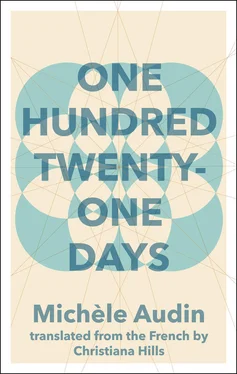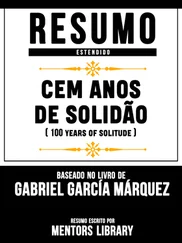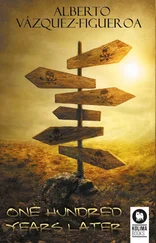I wonder if he has a fiancée. I think about all those girls whose lovers will return disfigured, and all those whose lovers will never return… I don’t know which will need more courage.
The worst will perhaps be for those who won’t know, because their men will have been declared missing.
November 14, 1916
Today, a surprise: Cousin Paul, dressed in full mourning attire, came to the unit. He had come to see a patient, and it was Lieutenant Mortsauf, my polytechnician! They spent the whole afternoon together, talking about mathematics. Paul had brought some books. I listened to their conversation while I was treating the others in the room — they were discussing things and writing formulas on sheets of paper that were then falling all around them onto the floor. When Paul left, I came over to remove the polytechnician’s stitches from his last operation. As I picked up the papers, he said, “So, Mademoiselle Marguerite, I take it you know Professor de Saint-Bonnet?” When I replied that he’s Mama’s cousin, he commended me. I told him that one of Paul’s sons had been killed in January and another last month, but he knew. He said that Paul was going to help him make use of his time at the hospital and that he was going to write a dissertation.
Friday, December 1st
As I move throughout the room, treating the other patients, I can see the polytechnician filling entire pages of his little yellow notebooks with calculations. Paul comes to see him two or three times a week. Sometimes he brings other mathematicians, and the patient always introduces me to them as “Mademoiselle Marguerite, the nurse who saved my life.” He tells me he owes his “second birth” to me. He explains his work to them; sometimes he tears sheets from his notebook and they take the papers with them. I don’t understand what they talk about, and besides, I don’t have time to listen, but I know that when they’re here, he smiles more. Even underneath the layers of gauze, I can discern a smile as soon as one is there. Today I heard them speaking in the stairwell as they were leaving.
Paul was crying and I could see his colleague had teary eyes. I know Paul was thinking about his two sons. Jacques, his oldest, was so brilliant, and he hadn’t even had time to start working on anything. At least he died gloriously. Glory and honor are also (I don’t dare write what they are above all) death and tears.
December 11, 1916
Last week, like he asked me, I brought home a few pages from the polytechnician’s notebook to write out a clean copy in the evenings — that’s why I haven’t had time to write in this diary.
I told him I really like his handwriting, but I don’t understand any of it and I hope I don’t write something foolish or add in mistakes.
Maybe I spend a little too much time talking to him. I worry that the other patients in the room, behind the beige curtains, resent me. So I try to speak with some of them as well. I give words of comfort to those coming back from rehabilitation sessions, where heavier and heavier weights are attached to their lower jaws in order to help their muscles get used to opening their mouths, in spite of their deformed jawbones. Sometimes I write letters for those who don’t know how to write very well. Last night, I even played charades with two of them. Although I had to force myself at the beginning, we were soon laughing together. But laughing also makes them suffer.
December 19, 1916
I’ve finally finished copying the one hundred twenty pages that Christian (Lieutenant Mortsauf asked me to call him by his first name) gave to me. Fortunately, his handwriting is very readable. When I told him once more I didn’t understand any of it, he laughed and replied “Of course you don’t understand any of it, it’s not for girls, do you expect a girl to understand the transcendence of π?” But he seemed very satisfied. I could see him smiling under the bandages then, too.
The battle of Verdun is finally over. Major de Brisson says 300,000 men died there. But their sacrifice was not in vain because the victory was ours.
December 20, 1916
I stayed very late at the hospital yesterday evening. The doctors aren’t finished with my polytechnician, so he’s going to have to stay here for the holidays. In any case, his family is in Africa, and it would be out of the question for him to get leave to visit them. He told me about the village where he was born, where his parents run a peanut plantation. He described a big river, with the Negroes’ pirogues, the pelicans, and beautiful trees called flame trees. He told me about his mother, Saint Theresa of Avila, Saint John of the Cross, and a little yellow dog, a kind of retriever, that he loved very much and that had died. If I were a man, I think I would like to travel and see such places. But a woman’s place is the home.
He told me, very tenderly, about a nurse, a young nun who had cared for him in Africa. He also mentioned his injury and the evil fairy Carabosse.
December 21, 1916
I brought him a few books.
Friday, December 22
I stayed very late at Val-de-Grâce, but Major de Brisson drove me home. It was nighttime and very cold. I was so moved by what happened today that I couldn’t speak in the automobile.
I spent the evening with my injured soldier; together we read the books I had brought him. He didn’t really appreciate Dante, whom I like a lot. I opened the book to the page where the song of Ulysses begins. “It’s very beautiful,” he said, “but I prefer Shelley,” and he quoted:
The soul’s joy lies in doing.
I must confess that I thought of Robert again. But we mainly read Papa’s poems:
Jesus, the wounded one, the sinner, the wanderer
Washes his ailing heart in the flow of Your blood.
That’s when I felt a real bond between us. Then we talked a lot; he asked me how we had fared after Papa’s death, I explained how he had made some shrewd investments, and how since Mama was wealthy, too, we were living quite comfortably. He seemed pleased with this, as well as when I said that Papa had bought a beautiful house in Normandy and that we also owned an apartment on Rue d’Artois, where Papa had worked and which Mama was renting out. It’s really nice of him to be so interested in us.
I have leave for Christmas, so I’m going to spend the holidays with Mama and Thérèse.
Christmas
I got up early this morning and decided to take stock of my feelings in this diary.
I have to revisit what happened with Robert in March. He needed a lot of support, both morally and, I think, spiritually. I admit, I really enjoyed our conversations. But I didn’t expect him to ask me to marry him. Naturally, I refused. He asked me why, like a child, and I answered that we were too different.
I haven’t even told Mama about it. I know Papa would never have agreed for me to marry a Jew, Papa who, along with Cousin Paul and a few others, founded the League of the French Homeland during the affair with that man Dreyfus.
Wednesday the 27th
I returned to the hospital today. Lots of work, as if the Germans wanted to celebrate Christmas by killing as many of our men as possible. Yet there’s talk of a truce here and there. I didn’t have time to talk to him.
January 2, 1917
Today I had to try to comfort two wounded men who were crying because they were thinking about their fiancées. “I’m a monster,” one was saying, “She won’t want me anymore,” the other was saying, “No one will want me,” said the first, all of this in sobs.
I hope their fiancées will think of the sacrifice they have made for our country and will love them for their moral greatness. I asked to pray with them, but one told me that while he would be grateful if I could pray for him, he could never pray again. The other, who works in an automobile factory in civilian life, turned his back and pretended to sleep.
Читать дальше












